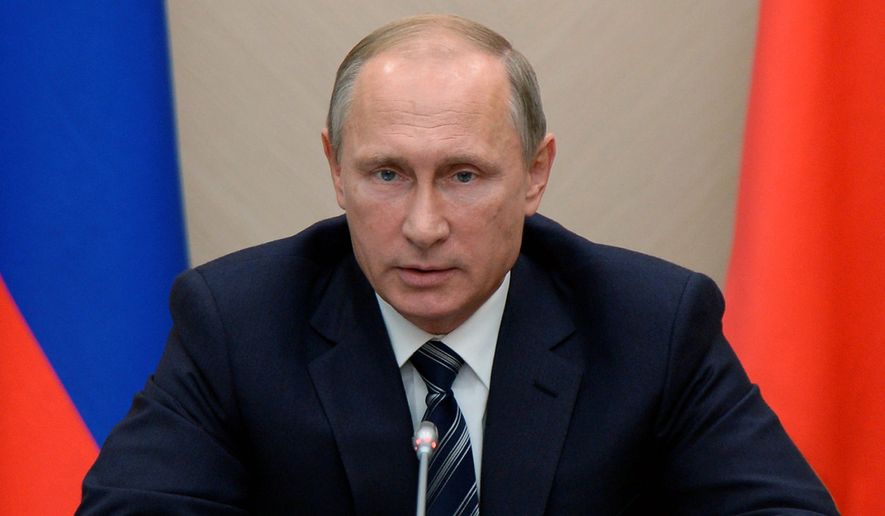Russian President Vladimir Putin’s new air war over Syria will not be conducted with the niceties of the ongoing American campaign because the Russians lack sophisticated smart bombs, do not adhere to rules against killing civilians and will hit targets beyond the Islamic State’s terrorist army.
Defense Secretary Ashton Carter said Wednesday that there is already evidence that Russian planes are attacking areas where Islamic State fighters are not stationed.
“We have been observing Russian activities. One of the reasons why the Russian position is contradictory is that [there is] the potential for them to strike, as they may well have, in places where in fact ISIL is not present,” Mr. Carter said, using an acronym for the Islamic State. “Others are present. That is precisely the problem with this whole approach.”
This suggests that Mr. Putin will strike all enemies of his longtime ally, Syrian President Bashar Assad, including the U.S.-supported Free Syrian Army.
The Russian strategy is creating an even more chaotic air war in which Russia and the United States are on distinctly opposite sides and could come into conflict.
Mr. Carter said a U.S. team is to meet soon with Russian counterparts to ensure there is no mishap or miscalculation over Syria as scores of jet fighters, surveillance planes and drones crisscross the skies.
SEE ALSO: Russia says it targets not just Islamic State in Syria
“We’re always concerned about the possibility of inadvertent incidents and lack of communication,” the Pentagon leader said. “That is why it’s important to have communication in the air.”
He said the Russian policy of freewheeling strikes “is doomed to failure” because it will further inflame the civil war.
In the one-year-old air war, the large majority of U.S. warplanes have returned to bases without dropping any ordnance because of strict rules of engagement that put off-limits many urban targets in Mosul, Iraq, and Raqqah, Syria, the home of the Islamic State.
To date, Russia lacks satellite-guided bombs that can place munitions within feet of an aim point, according to experts. Although Russian jets have flown only a few missions so far, they can be expected to drop mostly “dumb” bombs in clusters, putting civilians at risk.
“Putin will be ruthless in his use of air power against the Free Syrian Army and hopefully against ISIS,” said retired Air Force Lt. Gen. Thomas McInerney. “But we should be very concerned about the good Sunnis in the FSA. The Russian rules of engagement [are] totally different than ours, which the Obama administration has deliberately designed to neutralize U.S. air power effectiveness.”
Said Jacob Kipp, a Russia military historian and former director of the Army’s Foreign Military Studies Office at Fort Leavenworth, Kansas: “I think the Russians will be nasty. They don’t have the same weapons systems. Judging by past air experiences, they tend to just drop a lot of ordnance. It tends to be ’dumb.’”
’They create a kill zone’
Mr. Assad himself has shown little concern for civilians. He killed hundreds with chemical mustard gas. Lately, he has been unleashing barrel bombs, a metal encasement filled with explosives, as well as chlorine bombs and tons of unguided ordnance supplied by Russia.
There is the possibility that Mr. Putin might use his forces to level the city of Raqqah in eastern Syria, from where the Islamic State directs global killing operations.
Mr. Putin directed what is called the “second war” against Chechnya and Islamic rebels in 1999. One brutal strategy: leveling the capital, Grozny, with a combination of air and artillery bombardments and ground troops.
“They set out to effectively destroy it,” Mr. Kipp said.
But the Russian president so far has not dispatched sufficient forces to level Raqqah.
“You have to advance to Raqqah, which may not be as easy as it sounds,” Mr. Kipp said.
Instead, the Russian military seems to be preparing to wage what, for it, is a classic air campaign: Create a zone, fill it with air defense missiles and counter-radar batteries to make sure there is no threat to its aircraft, and then start the bombing.
“They do not look at fighters to build air defense alone,” Mr. Kipp said. “They try to create a bubble of air defense systems. They have a different approach to how airspace is managed. Basically they create a kill zone.”
The Associated Press reported that a U.S.-backed rebel army, Tajamu Alezzah, said Russian jets tracked the group’s location in the town of Latamna in Hama province. Syrian military officials also said Russian jets bombed the town of Homs.
Why has Mr. Putin suddenly made Syria a top military priority, first shipping in arms, then sending in enough forces to create and defend air bases and then, on Wednesday, ordering the U.S. to stop flying warplanes over the country?
Retired Army Gen. David Petraeus, the former top commander in both Iraq and Afghanistan, told the Senate Committee on Armed Services that Mr. Putin is attempting to rebuild the Soviet empire to some degree.
Mr. Petraeus took a swipe at the Obama administration, which was split in 2011 on whether to provide arms to moderate forces and thus sent very little help.
“Russia’s recent military escalation in Syria is a further reminder that when the U.S. does not take the initiative, others will fill the vacuum, often in ways that are harmful to our interest,” Mr. Petraeus said.
Mr. Kipp said Mr. Putin is not so much interested in keeping Mr. Assad in power as he is in maintaining Syria’s anti-U.S. Baath Party and its military.
“The whole party apparatus, the Baath Party, has been very, very close to Russia,” he said. “The military guys have all been to Russia. They went to Russian military training. They’ve gotten Russian equipment since the 1950s.”
• Rowan Scarborough can be reached at rscarborough@washingtontimes.com.




Please read our comment policy before commenting.